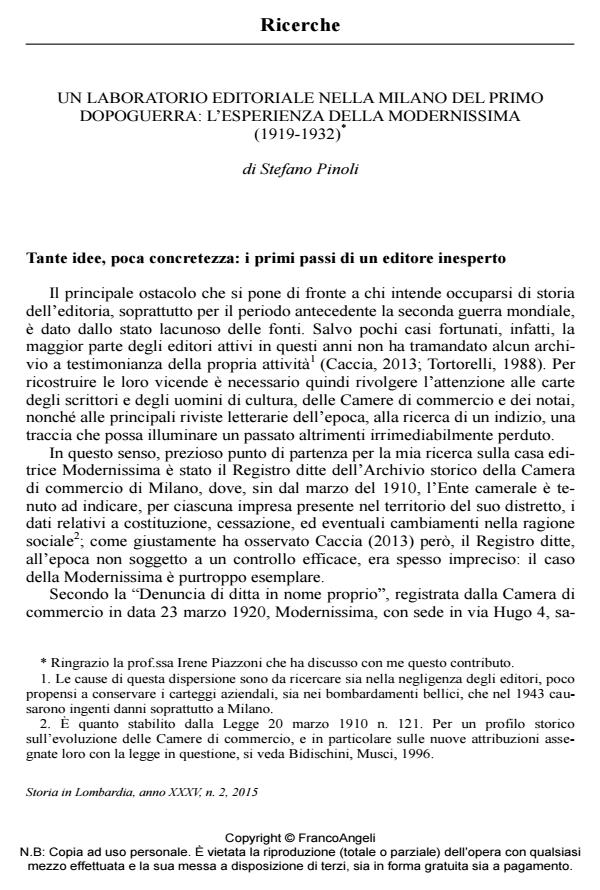An editorial house in Milan during the first post-war period: The history of the Modernissima (1919-1932)
Journal title STORIA IN LOMBARDIA
Author/s Stefano Pinoli
Publishing Year 2016 Issue 2015/2
Language Italian Pages 28 P. 36-63 File size 386 KB
DOI 10.3280/SIL2015-002002
DOI is like a bar code for intellectual property: to have more infomation
click here
Below, you can see the article first page
If you want to buy this article in PDF format, you can do it, following the instructions to buy download credits

FrancoAngeli is member of Publishers International Linking Association, Inc (PILA), a not-for-profit association which run the CrossRef service enabling links to and from online scholarly content.
Even if it only had a short period of activity and poor economic conditions during its entire existence, editorial house Modernissima is still regarded as a very important member of the Italian editorial landscape during the start of the 1900s. Anticipating the so-called "decade of translations", when various national editors started to include works from foreign writers to their catalogues, this small editorial house started to specialize in spreading translated literature early in the 1920s. The author wants to prove that Gian Dàuli, who was born in Vicenza and serving as director of Modernissima since 1924, played a key role in choosing this futurethinking approach: it was him who discovered authors such as Jack London (hitherto unknown in Italy at that time) and made him renown in the country, and he also devised the ambitious project called "Scrittori di tutto il mondo" (Writers from all over the world), the first Italian series completely devoted to contemporary foreign literature. This collection, published by Modernissima between 1929 and 1932, summoned the interest and curiosity of several intellectual figures of the time (Cesare Pavese even offered to collaborate to the project) and published among others the first Italian translation of Doblin, Schnitzler and Mann as well American authors Sinclair Lewis and McKay. "Scrittori di tutto il mondo" became a reference point for other editors during the Thirties and represented the first attempt of de-provincializing Italian culture during the years of the Fascist regime.
Keywords: Gian Dàuli, publishing history, translations, Americanism, Harlem Renaissance, publishing house Modernissima
Stefano Pinoli, Un laboratorio editoriale nella Milano del primo dopoguerra: l’esperienza della modernissima (1919-1932) in "STORIA IN LOMBARDIA" 2/2015, pp 36-63, DOI: 10.3280/SIL2015-002002